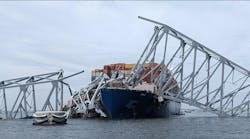Pallets don't normally cost an arm and a leg, but they can cost a few fingers, or at least a sore back, especially pallets that weigh 65 pounds. At companies built around building such pallets, incidents like this often become considered normal occupational hazards. Even companies that build safety into their culture may find it hard to go a year without someone getting hurt.
That's why a company in this industry that goes four is worth noting. The 52 team members working at Millwood, Inc.'s pallet plant in Hamilton, Ohio recently celebrated the passing of 1064 accident free days. Frank Hyatt, human resources manager and chaplain at the plant, remembers the date of that plant's last OSHA reportable accident: February 9, 2006. It involved an operator getting his hand “jammed” on a band saw. No fingers lost, but it was enough of a wake-up call to start paying more attention to accidents like that as well as nail gun ricochet and even back injuries. In fact just installing lift tables has reduced back injuries considerably for Milwood, Hyatt says.
“Seventy-five percent of injuries happen within the first 90 days, and some within 30,” he told me. “We pay by the piece, and some workers aren't used to throwing a pallet around. That's why we have a 21 day training program. We don't force anyone out there until they're ready.”
Hyatt is proud of the results. With only two safety people working for him and having responsibility for 24 facilities around the country, seven of those plants have gone more than a year without an accident. The Nashville and Pittsburgh facilities have gone two. Milwaukee has gone three. Hyatt believes this is because Milwood has made safety an important part of taking care of its team members. It also holds them accountable. Enforcing safety rules is an important part of every manager's daily routines.
“It's better that we spend time retraining and even disciplining a team member than to spend time in the hospital because of an avoidable accident,” says Antonio Delgado, manager of the Hamilton, OH plant.
But when an accident does happen, Hyatt's role as chaplain comes in handy. Workers and their families appreciate the company's policy of allowing Hyatt to travel to locations where team members end up in the hospital. The 1200 people company-wide for whom he is responsible see him as an extension of the company.
“When team members around the country see that management cares about them, that makes them want to adhere to our standard operating procedures and not cut corners,” Hyatt concludes. “Anybody can say things in front of a bunch of people and act spiritual, but when somebody's on second shift in another city and you go into their living room behind the scenes, word gets out that the owners of this company are for real.”


